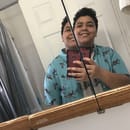When most people think of Harry Styles, they think of One Direction. But when Directioners think of Harry Styles, they think of everything he stands for. Styles has been known to advocate for love and acceptance. During Harry Styles: Live on Tour he sold merchandise decorated with the phrase “Treat People with Kindness”. The tour raised $1.2 million for 62 charities, registered voters, and partnered with Reverb for water conservation. Styles also released two pride shirts with all proceeds going to support GLSEN, formerly the Gay, Lesbian & Straight Education Network, to help make schools safer for LGBTQ youth. When I think of Harry Styles, I think of how he made feel safe in my sexuality and gender.
I am a queer kid who grew up in a Latter Day Saints family in Salt Lake City. Utah is not the easiest place for someone like me to grow up. I grew up closeted and used straight culture things like Twilight, Justin Bieber, and of course, One Direction to prove my cisgender and heterosexual status. As I grew older and more comfortable with myself, I grew out of Twilight and Justin Bieber, but I never grew out of One Direction. One Direction—for me and many others—was a lot more than a boy band. With Twitter, Instagram, Vine, and all the other social media platforms it was easy to see clips of the boys on stage and interviews. The boys we got to know always showed an immense amount of care and appreciation for ALL people and especially women. To see a group of teenage boys—perhaps the most famous group of teenage boys in the world—talk about women with such respect meant the world to me.
After One Direction the boys had a massive platform. Harry Styles used his position to spread a clear message of love and acceptance. For his 2017 tour, he decided to tour with MUNA, a dark pop band whose members, Katie Gavin, Josette Maskin, and Naomi McPherson who are all queer women. MUNA emphasizes that their music is meant to capture the experience of today’s queer youth and Harry Styles gave them a platform to broadcast to the world. Harry Styles would follow MUNA’s performances with his own advocating for the LGBT community. Styles danced with a pride flag on stage at every single performance during his cover of “What Makes You Beautiful.” Often those dubbed as icons for the LGBT community are women, so seeing a man do something like this every night made an revolutionary impact.
During the 2018 leg of his tour, Harry went from ally to community member when he performed the unreleased song “Medicine.” During “Medicine” Styles proclaims: “The boys and the girls are in / I messed around with him and I’m okay with it.” Before this release, Styles had always avoided labeling his sexuality and still hasn’t placed a specific label on it. It’s amazing to have such a wildly popular and deeply loved addition to the community, and his lack of a specific label can actually be extremely validating to certain members of the LGBTQ+ community.
As the vocabulary of the LGBTQ+ expanded to be more inclusive than ever, I kept expecting to find a label that would accurately describe my sexuality and gender identity. I felt it was what I was “supposed to do,” but Harry Styles reminded me that there is nothing we are “supposed to do.” Harry Styles’ eccentric style and flamboyant mannerisms are a perfect example of how there is no correct way to display masculinity. In the same way, I was reminded by Styles that my lack of a specific label does not make my experience any less meaningful and valid.



